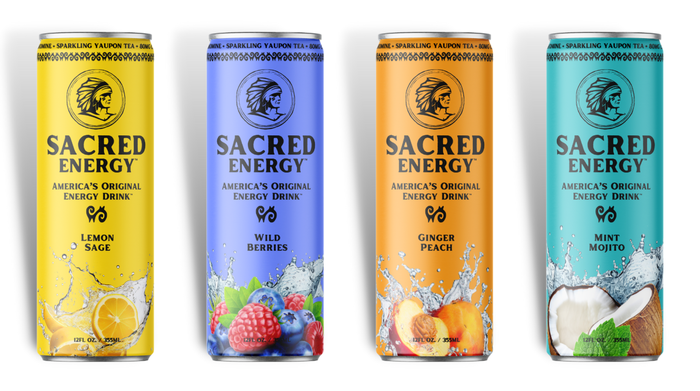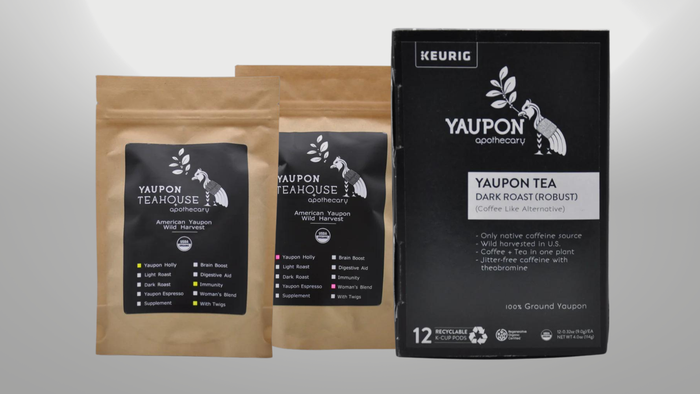3 founders bring yaupon’s jitter-free energy to beverage aisles3 founders bring yaupon’s jitter-free energy to beverage aisles
Natural and organic consumers are embracing yaupon, a plant Indigenous people revered and North America’s only native caffeine source. Meet three founders.

It was 2011, the driest year in recorded Texas history. Historic oak trees died. Ranchers sold off cattle. The drought cost $7.62 billion in crop and livestock losses. In the midst of it, Abianne Falla noticed the only thing not withering away was yaupon, a wild member of the holly family that thrives in parts of Texas and the South. And then she began wondering if yaupon could be used in food.
“You can’t live in this region and not know about yaupon. It takes over fence lines, invades buildings,” she said. “Once we started researching the plant, we found that it’s the only caffeinated plant native to North America and that every Indigenous tribe along the Gulf Coast used it extensively, and that it was traded across North America.”
Two years later, Falla, a member of the Chicksaw Nation, launched Catspring Yaupon, a company largely focused on offering yaupon wholesale to brands, along with its own line of loose-leaf and bagged yaupon products. Fast-forward a decade, and yaupon finally is gaining traction in the market.
Among other things, Whole Foods Market identified yaupon as one of the top trends of 2023. New yaupon ready-to-drink yaupon brands are just entering the market, and RTDs that have been around for a bit, like Rambler, have added yaupon-fueled drinks to their lineups.
Yaupon is related to yerba mate and guayusa, South American plants that brands and consumers have widely adopted.
“For the first nine or 10 years it was like pushing a boulder up a mountain,” said Falla, who over the years worked methodically to introduce yaupon to kombucha crafters, energy drink brands, hotels, restaurants and spas. “But we’ve seen a big groundswell in the past year. I think yaupon’s time has arrived.”
Today, Catspring harvests Regenerative Organic Certified (ROC) yaupon from 1,100 acres that it leases and supports a conservation arm that helps restore native grasses in places where yaupon has taken over. The ideal is to have yaupon interspersed with native grasses, Falla said.

Catsprings’ bounty of ROC yaupon has led to the launch of several new brands. Paul Frantellizzi and his wife, Pamela Peters—who has ancestors from the Houma nation and Taino people—expect to launch Sacred Energy in March.
“In a category that is flooded with product containing too much caffeine, high sugar and synthetic ingredients, we believe the time is right for a brand that brings us back to our American heritage and gives back to community, all while being a healthy option,” Frantellizzi said.

Tide Beverages uses yaupon in its functional seltzer waters as well as a separate line of alcoholic drinks.
The slow but steady expansion of yaupon availability and its rising trendiness informed the launch of Tide Beverages, a line of Yaupon-spiked seltzers—along with a separate brand of alcoholic drinks infused with the plant. President and CEO Ryan Waier anticipates releasing the products in February, after more than a year of product development and R&D.
Yaupon's botanical makeup improves the caffeine experience, he said. Instead of yielding the anxious jitters that often accompany caffeine, other ingredients in the plant smooth out the caffeine boost, making it gentler and better for focus.
The biggest knock against yaupon, he said, is price: It’s more pricey than its relative, yerba mate.
"Nobody could figure out a way to get this into a can for the cost. And the cost is labor," he said. "But I think efficiencies will be coming to yaupon. People are starting to look at machinery for harvesting."

Yaupon Wellness Company owns two yaupon farms and manufactures tea.
From an island to a teahouse
Another contemporary yaupon entrepreneur, Yaupon Wellness Company founder Lou Thomann, learned about yaupon after a walk on an island off the coast of Georgia in 2010. A naturalist introduced Thomann to the plant, harvesting and brewing it for him. After the hike, Thomann’s research uncovered insights similar to Falla’s, from the plant being North America’s only native source of caffeine to its prominence among Indigenous tribes.
His company focused on farming, harvesting and processing yaupon for its incense, herbal smokes and body care products. In 2019, he opened Yaupon Teahouse and Apothecary in downtown Savannah, Georgia. The operation today includes hundreds of ROC acres of farmland in Georgia and the Florida Panhandle.
“Just the last six months, it’s been interest from Whole Foods, The Washington Post, Forbes magazine. We are getting calls from a lot of people,” he said. “It’s native, it’s hardy, it’s drought and pest resistant. Deer avoid it, and it doesn’t need inputs like most crops,” Thomann said.
Education stands as a challenge, although that’s improving, thanks to media attention, he said.
Yerba mate has been in the marketplace for more than 30 years, but it’s only been for the past seven years that North American companies have started gaining substantial investments, he said.
“It’s a journey,” he said. “There’s a lot of convergence going on: a desire for things that are authentic, that have ancient traditions.”
About the Author
You May Also Like



.jpg?width=700&auto=webp&quality=80&disable=upscale)

.png?width=700&auto=webp&quality=80&disable=upscale)